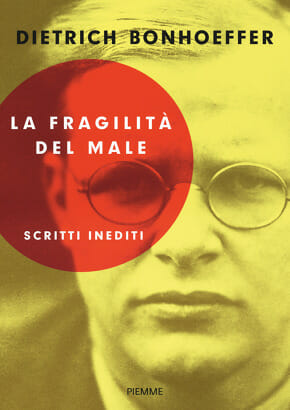
Dec 20, 2015 | Focolare Worldwide
 Bonhoeffer was among the first to criticise the Third Reich and was in the United States when the Second World War broke out. He returned to his homeland to suffer with his people. Conscious of the risk, he faced it in a spirit of freedom and with a strong sense of justice. A theologian and Lutheran pastor, he died at a concentration camp in Flossenbürg on April 9, 1945 after being condemned for his opposition to the Nazi regime. We remember him with some of his thoughts on mercy published in “La fragilità del male, raccolta di scritti inediti”. “Each day the Christian community sings: ‘I have received mercy.’ I have obtained this gift even when I closed my heart to God: when I took up the path of sin; when I loved my faults more than God; when I encountered misery and suffering in exchange for what I had done; when I was lost and was not able to find the path of return. Therefore, it was the word of the Lord that came out to meet me. Therefore, I understood: He loves me. Jesus has found me: he was near to me, only Him. He gave me comfort, forgave all my errors and did not find me guilty of evil. When I was his enemy and did not respect his commandments, he treated me like a friend. When I did him wrong, he returned to me only goodness. He did not condemn me for my misdeeds, but unceasingly sought me out and without rancour. He suffered for me and died for me. He put up with everything for me. He won me. The Father had found his son again. We think of all these things when we intone that song. I can hardly fathom why the Lord loves me in this way, why I am so dear to him. I cannot understand how he managed to and wanted to win my heart with his love, all I can say is: ‘I have received mercy.” Dietrich Bonhoeffer, La fragilità del male, raccolta di scritti inediti (Piemme, 2015)
Bonhoeffer was among the first to criticise the Third Reich and was in the United States when the Second World War broke out. He returned to his homeland to suffer with his people. Conscious of the risk, he faced it in a spirit of freedom and with a strong sense of justice. A theologian and Lutheran pastor, he died at a concentration camp in Flossenbürg on April 9, 1945 after being condemned for his opposition to the Nazi regime. We remember him with some of his thoughts on mercy published in “La fragilità del male, raccolta di scritti inediti”. “Each day the Christian community sings: ‘I have received mercy.’ I have obtained this gift even when I closed my heart to God: when I took up the path of sin; when I loved my faults more than God; when I encountered misery and suffering in exchange for what I had done; when I was lost and was not able to find the path of return. Therefore, it was the word of the Lord that came out to meet me. Therefore, I understood: He loves me. Jesus has found me: he was near to me, only Him. He gave me comfort, forgave all my errors and did not find me guilty of evil. When I was his enemy and did not respect his commandments, he treated me like a friend. When I did him wrong, he returned to me only goodness. He did not condemn me for my misdeeds, but unceasingly sought me out and without rancour. He suffered for me and died for me. He put up with everything for me. He won me. The Father had found his son again. We think of all these things when we intone that song. I can hardly fathom why the Lord loves me in this way, why I am so dear to him. I cannot understand how he managed to and wanted to win my heart with his love, all I can say is: ‘I have received mercy.” Dietrich Bonhoeffer, La fragilità del male, raccolta di scritti inediti (Piemme, 2015)
Dec 19, 2015 | Non categorizzato
https://vimeo.com/140678777 A child recounted: «I only knew about Santa Claus, but nobody has ever told me the real story of Christmas, the birth of Jesus!» Another child said, «Oh yes, people have forgotten, but we can remind them about it! Still another added «All the other kids in the world have already started!» These are the gen4 boys and girls “who love everybody the way Jesus does and want to show everyone that He is the greatest gift of all!” They learnt this from Chiara Lubich, founder of the Focolare Movement, who had urged them to “Let Jesus be born in your midst with your love, so that it will always be Christmas! […] We can offer Jesus in our midst to the whole world, and bring this love and joy to the streets, schools, and to the big and small… everywhere!” Years ago at Christmas, while walking through the streets of Zurich, Switzerland, Chiara had seen the shop windows adorned with lights and toys, and snow on the trees, Santa Claus… and had asked herself: But where is Jesus? He was not there. And so she wrote: «This wealthy world has taken Christmas for itself, but has dislodged Jesus.» «What does it mean to ”dislodge?”» A child asked. It means that Jesus has no place to go to, like when he was born and there was no room for him anywhere.» It was then that Chiara told us «So we must welcome him, and celebrate his coming! We, gen4 around the world, wish to do this and invite everyone to do the same.». Then came the idea of making a statue of Baby Jesus and nativity scenes to offer to those who do not know or do not remember that at Christmas, Jesus is more important than buying gifts. «We want to recall that Christmas is the feast of Jesus. And we tell people: do you want to bring him home with you? Some answer no, some keep walking on and do not even stop, but others stop and so we give these little statues of Jesus, or the nativity scenes we have made. We do this in the main squares of the big cities and in the shopping centers; we even give it to our mayors and go to the homes for the aged. We attract attention with our stands and concerts, and organise Christmas parties for many children. It is like a wave of happiness that overwhelms us all with happiness and brings the “celebrated Guest” back as the central point of Christmas.» On Sunday, 20 December, St. Peter’s Square will celebrate the Children’s Jubilee and Pope Francis will bless the statues of Baby Jesus. On the same day, the TV programme Sua Immagine (Rai Channel 1 at 10.30), will be dedicated to children, and will broadcast the reportage on the project “They Have dislodged Jesus.”
Dec 18, 2015 | Focolare Worldwide
The 11th edition of the School of Inculturation will be held in Kenya at the Mariapolis Piero, from 17 to 23 May 2016. Maria Voce and Jesús Morán will also attend. In May 2016 the “Mariapolis Piero” in Kenya, close to Nairobi – will host the 11th edition of the School of Inculturation, a reality which Chiara Lubich prophetically foresaw. The 250 or more delegates from Sub-Saharian Africa will focus on the theme, “The African Family,” and will reflect on the relationships of “man-woman” in their roles and responsibilities in family life, and the challenge of educating towards values. It will be held as part of the Pan-African meeting of the continent’s New Families. The national commission will present the speeches and dissertations that will trace the roots of the cultures, to be demonstrated through the concrete experiences of men and women who have embraced the charism of unity. There are great expectations and a particular joy in knowing that Maria Voce and Jesús Morán, President and Co-President, respectively, will attend together with some central councilors. Further details to be announced.
Dec 18, 2015 | Non categorizzato
This year, the usual appointment promoted by the youth of the Focolare and aims to involve the greatest number of people and institutions in their journey towards fraternity, will be cantered in Quito, Ecuador. The theme of inculturality, with a manifestation of the youth at the so-called “Other half of the world,” where one can enter with one foot in the boreal hemisphere and the other in the austral hemisphere. There will be days of dialogue among young people of different cultures, through work sessions, sharing and community tourism in a setting of exuberant nature. Complete information on the Ecuador programme is given on the site, www.munodunido2016.com. “Link Cultures – un camino para la paz” is the title that expresses the core of all the fraternity initiatives that will ensure simultaneously throughout the world, uniting generations and cultures in a unique workshop and can be traced through the hashtag #4peace. Run4Unity – Another novelty this year is the involvement of the kids: the wold sports event, Run4Unity, the world relay race for peace which in the previous editions saw the participation of thousands of teens, which will be held annually from now on, and will be inserted in the United World Week. The La Run4Unity 2016 will take place next 8 May. The Youth for a United World hope that this on-the-road International Expo, now running on its 20th anniversary be also recognised by the UN. The initiatives that come about during the year, and on which the United World Week focuses its spotlight, are all part of the United World Project.
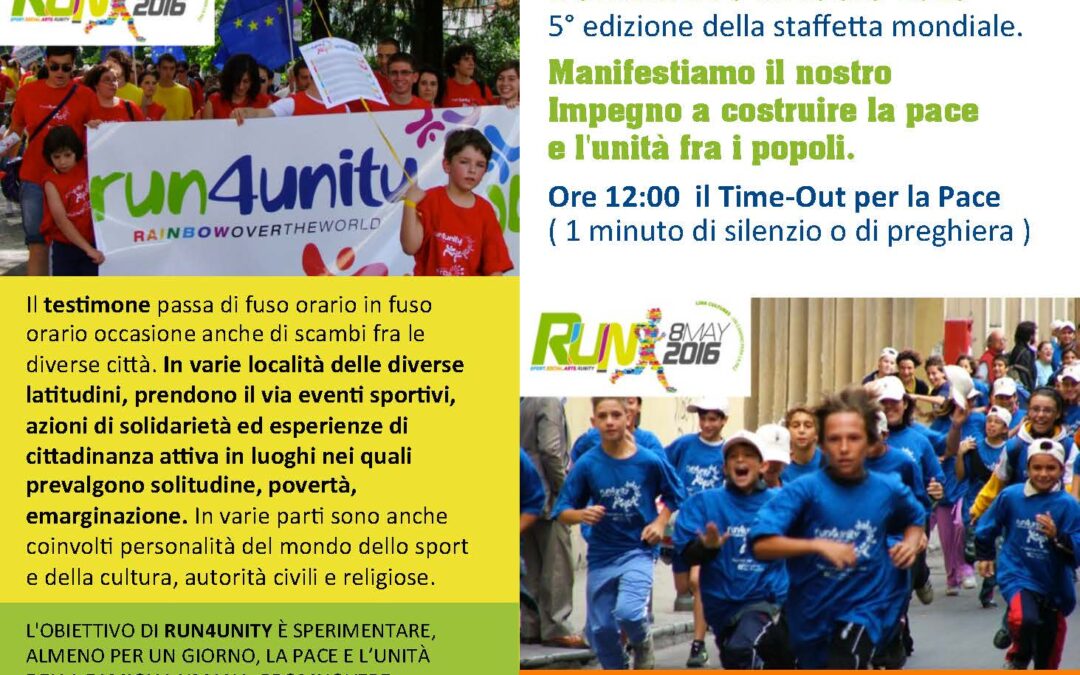
Dec 18, 2015 | Non categorizzato
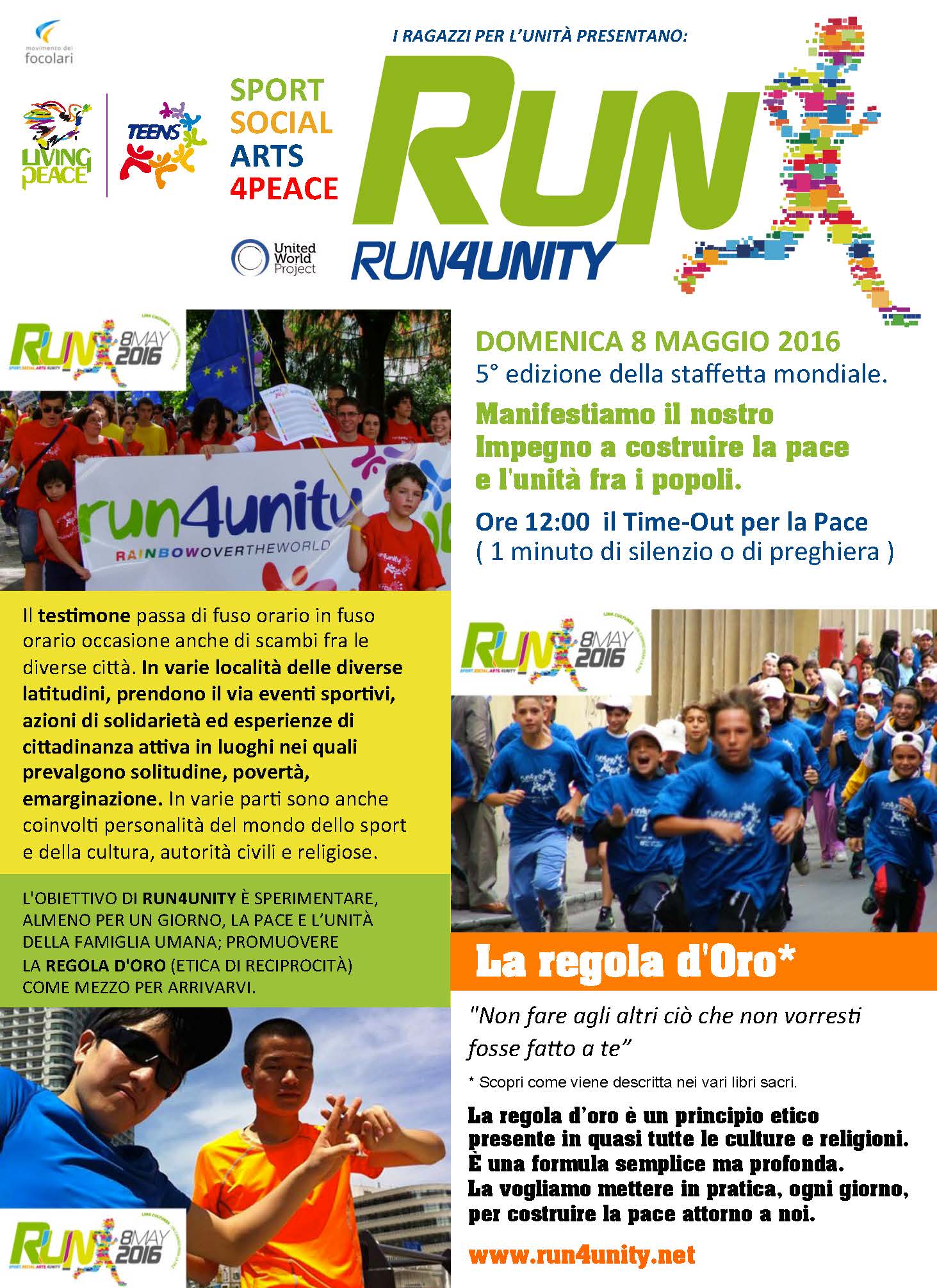 From 11 am to 12 noon in all the time zones, children throughout the world will run for peace (a stretch of the itinerary will be done on foot or by bike, roller skates, and canoe) with an extraordinary passing of the baton, from the cities situated in a preceding time zone to another. How? Through a phone call, or text message or at least “ideally linking up” with the others. 12 noon is the Time-Out, a minute of silence or prayer for peace. The day on which the Run4unity will be held will be called “World Day of the Golden Rule”: upon putting it into practice and promoting it, we will silently but effectively build Peace and a more united world. The web site http://www.run4unity.net is the tool which will highlight the world demonstration, in continual connection with social media, to allow all the boys and girls to be active in building and spreading the Event. There have been four international editions of this project: in 2005, 2008, 2012 and 2015. The R4U event is really quite unique since it links kids throughout the world, and who in a time span of 24 hours, from one time zone to the other, undertake to achieve a sole objective: unity of the human family. This explains the great interest of the mass media, and civil, religious and political authorities. Run4Unity is part of the activities of the United World Week and United World Project. Info: http://www.run4unity.net/ https://www.youtube.com/watch?v=SYR8R-_Rg_M
From 11 am to 12 noon in all the time zones, children throughout the world will run for peace (a stretch of the itinerary will be done on foot or by bike, roller skates, and canoe) with an extraordinary passing of the baton, from the cities situated in a preceding time zone to another. How? Through a phone call, or text message or at least “ideally linking up” with the others. 12 noon is the Time-Out, a minute of silence or prayer for peace. The day on which the Run4unity will be held will be called “World Day of the Golden Rule”: upon putting it into practice and promoting it, we will silently but effectively build Peace and a more united world. The web site http://www.run4unity.net is the tool which will highlight the world demonstration, in continual connection with social media, to allow all the boys and girls to be active in building and spreading the Event. There have been four international editions of this project: in 2005, 2008, 2012 and 2015. The R4U event is really quite unique since it links kids throughout the world, and who in a time span of 24 hours, from one time zone to the other, undertake to achieve a sole objective: unity of the human family. This explains the great interest of the mass media, and civil, religious and political authorities. Run4Unity is part of the activities of the United World Week and United World Project. Info: http://www.run4unity.net/ https://www.youtube.com/watch?v=SYR8R-_Rg_M
Dec 18, 2015 | Non categorizzato
“Unity”, the basic point of the spirituality of the Focolare Movement, will be deepened during this meeting, with experiences of people from various cities, where the spirituality lived by many has affected the life of those regions. This is the case of the community of Szeged, Hungary, or Loppiano, in Valdarno, Tuscany and again on ecumenism in Great Britain, and the social field in Brazil. One of the many themes to be discussed is the aspect of communications as a tool used to reach unity; dialogue especially in the ecumenical and interreligious field, and the Focolare Movement’s commitment for peace. The great majority of those participating will be from Italy but also from France, Hungary, Greece and England. For information and bookings: info@focolare.org www.centromariapoli.org
Dec 18, 2015 | Non categorizzato
«Unity» the basic point of the spirituality of the Focolare Movement, will be deepened during this meeting, with experiences of people from various cities, where the spirituality lived by many has affected the life of those regions. This is the case of the community of Szeged, Hungary, or Loppiano, in Valdarno, Tuscany and again on ecumenism in Great Britain, and the social field in Brazil. One of the many themes to be discussed is the aspect of communications as a tool used to reach unity; dialogue especially in the ecumenical and interreligious field, and the Focolare Movement’s commitment for peace. The great majority of those participating will be from Italy but also from France, Hungary, Greece and England. Another congress on the same themes will be held from 3- 5 March. Info: info@focolare.org www.centromariapoli.org
Dec 18, 2015 | Non categorizzato
About 60 Bishops from all over the word will meet in Castel Gandolfo to go deeper in mutual communion, and share and reflect on the theme of «unity,» the element which is central to the charism of the Focolare. For those who are interested, the program will continue up to the 28th with a visit to the international town of Loppiano.
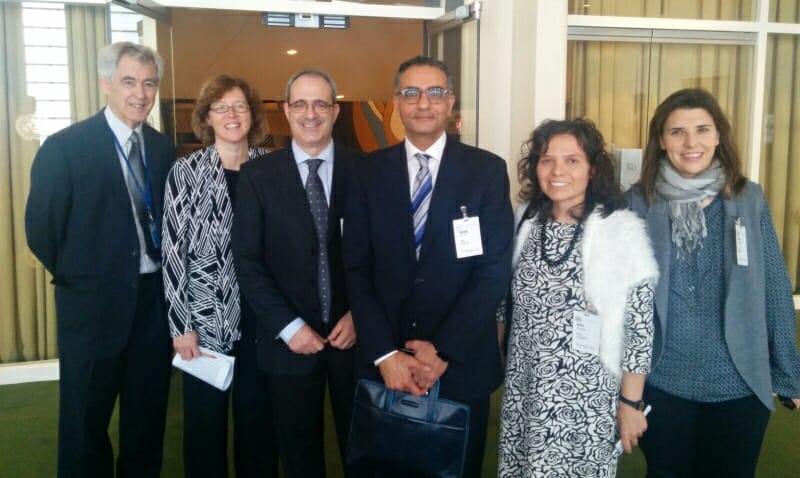
Dec 18, 2015 | Focolare Worldwide
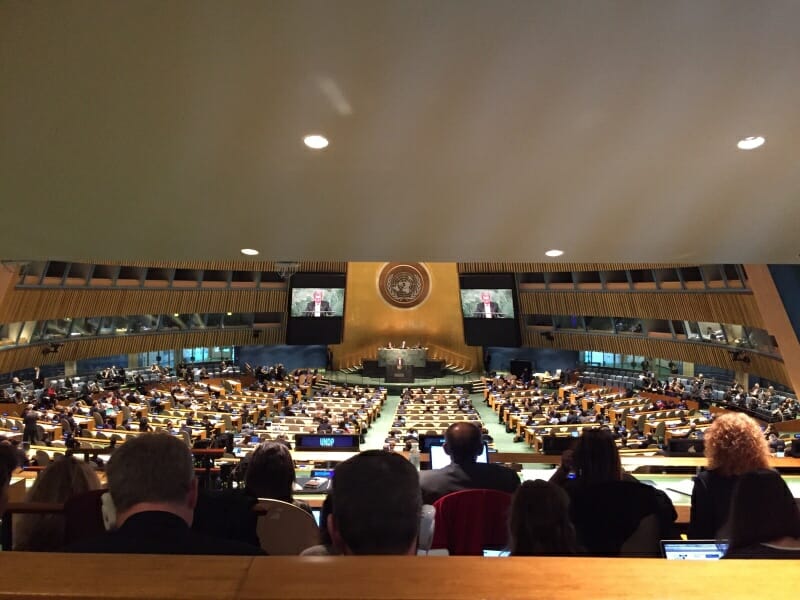
A working session during the conference

With Mr Fadi Chehade, President of ICANN (centre), a non profit organisation which administers the assignation of top level domains on the Internet.
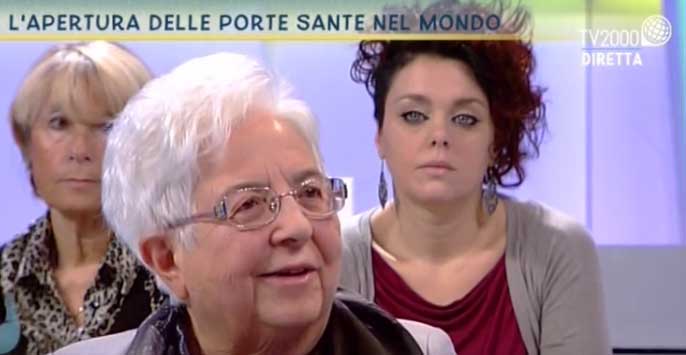
Dec 17, 2015 | Non categorizzato
 “Bel tempo si spera”, [Hoping for good times] is a programme broadcast by the Catholic Television Company TV2000. The programme on 14th December focused on subjects concerning the Jubilee, taking the viewers on a journey to several Cathedrals in the world, on the day after the opening of their Holy Doors. Maria Voce was in the studio, at the invitation of the presenter Lucia Ascione. Between one stage and another of this symbolic tour a dialogue took place on various subjects, starting with the meaning of the Jubilee. Maria Voce said, “The Year of Mercy gives us new courage to believe that God is Love. Now, when it seems that everything has become relative, we need to go back to what really matters, to believe in Love”. Later on, she added: “Unfortunately, modern culture speaks of anger, revenge, rights that have been trampled on, things that lead to sadness and despondency. We want to bring trust, forgiveness and mutual love. We want to look at the world as one family, the family of God’s children. And God is mercy, God is love.” “I like to recall – she went on – that the Pope did not open “the” Holy Door” but many holy doors. Pope Francis has said even the door of a prison cell can be a Holy Door. The door is a sign of the merciful love of the Father who is waiting for us all to come home, no-one excluded.” Lucia Ascione referred to Pope Francis’ words at the Angelus the previous day concerning the Focolare’s dialogue with Muslims. Maria Voce affirmed, “This harmonious encounter between people of different faiths that we experience did not happen yesterday, but has been built up day by day, over the years and in many places, through friendships; respecting difference.” Ascione insisted: “If it is so simple for you, why is it so hard for the world?” Maria Voce: “The Pope has said that unfortunately there is much self-interest. Instead we need to learn how to go beyond ourselves and be ready to welcome others, even if they are different. It is a love that we learn by loving, going towards others. Certainly, differences can make us fearful, that is true for everyone. It is a fear that can only be overcome with love. Taking up arms is of no use.” The presenter asked “You went to the United Nations and spoke there. What did you say to them? “I said that we need to convert ourselves, but not superficially. I said we must not see dialogue as one of many ways but as the only real way forward. It is difficult to accept this viewpoint because the “scandal of the cross” has not been understood. Mercy makes us do the part that the other should do, as Jesus did who died for each one of us.” Maria Voce explained “It is the experience that we have on a daily basis with those who knock on our doors. Recently 170 unaccompanied minors stayed in our little town in Holland and were made welcome”. Recalling the words of the press release that Maria Voce had issued after the Paris attacks, Ms Ascione asked: “What did you mean when you said we should ask ourselves whether everything that could have been done to avoid such violent reactions had been done?” “Very often we are affected by things that happen nearby, forgetting those that happen in other places where the horror of war is lived every day. We have communities in those places and we know that it is still possible to build something positive. We have doctors who don’t check to see whether a wounded person is a Christian or a Muslim; people who make their wells available to others when water is scarce, regardless of the religion they practice. Maybe we don’t know how to ask ourselves the right questions. That is why we questioned ourselves first of all. Perhaps we did not follow through with these things in the past. Being able to make an examination of conscience can open us up to hope. Seeing those who suffer, who are poor, we must not be afraid to open our hearts. We must not be afraid to empty our pockets and our wallets, to live simply and with respect for creation, seeing other people as brothers and sisters, part of the same family.”
“Bel tempo si spera”, [Hoping for good times] is a programme broadcast by the Catholic Television Company TV2000. The programme on 14th December focused on subjects concerning the Jubilee, taking the viewers on a journey to several Cathedrals in the world, on the day after the opening of their Holy Doors. Maria Voce was in the studio, at the invitation of the presenter Lucia Ascione. Between one stage and another of this symbolic tour a dialogue took place on various subjects, starting with the meaning of the Jubilee. Maria Voce said, “The Year of Mercy gives us new courage to believe that God is Love. Now, when it seems that everything has become relative, we need to go back to what really matters, to believe in Love”. Later on, she added: “Unfortunately, modern culture speaks of anger, revenge, rights that have been trampled on, things that lead to sadness and despondency. We want to bring trust, forgiveness and mutual love. We want to look at the world as one family, the family of God’s children. And God is mercy, God is love.” “I like to recall – she went on – that the Pope did not open “the” Holy Door” but many holy doors. Pope Francis has said even the door of a prison cell can be a Holy Door. The door is a sign of the merciful love of the Father who is waiting for us all to come home, no-one excluded.” Lucia Ascione referred to Pope Francis’ words at the Angelus the previous day concerning the Focolare’s dialogue with Muslims. Maria Voce affirmed, “This harmonious encounter between people of different faiths that we experience did not happen yesterday, but has been built up day by day, over the years and in many places, through friendships; respecting difference.” Ascione insisted: “If it is so simple for you, why is it so hard for the world?” Maria Voce: “The Pope has said that unfortunately there is much self-interest. Instead we need to learn how to go beyond ourselves and be ready to welcome others, even if they are different. It is a love that we learn by loving, going towards others. Certainly, differences can make us fearful, that is true for everyone. It is a fear that can only be overcome with love. Taking up arms is of no use.” The presenter asked “You went to the United Nations and spoke there. What did you say to them? “I said that we need to convert ourselves, but not superficially. I said we must not see dialogue as one of many ways but as the only real way forward. It is difficult to accept this viewpoint because the “scandal of the cross” has not been understood. Mercy makes us do the part that the other should do, as Jesus did who died for each one of us.” Maria Voce explained “It is the experience that we have on a daily basis with those who knock on our doors. Recently 170 unaccompanied minors stayed in our little town in Holland and were made welcome”. Recalling the words of the press release that Maria Voce had issued after the Paris attacks, Ms Ascione asked: “What did you mean when you said we should ask ourselves whether everything that could have been done to avoid such violent reactions had been done?” “Very often we are affected by things that happen nearby, forgetting those that happen in other places where the horror of war is lived every day. We have communities in those places and we know that it is still possible to build something positive. We have doctors who don’t check to see whether a wounded person is a Christian or a Muslim; people who make their wells available to others when water is scarce, regardless of the religion they practice. Maybe we don’t know how to ask ourselves the right questions. That is why we questioned ourselves first of all. Perhaps we did not follow through with these things in the past. Being able to make an examination of conscience can open us up to hope. Seeing those who suffer, who are poor, we must not be afraid to open our hearts. We must not be afraid to empty our pockets and our wallets, to live simply and with respect for creation, seeing other people as brothers and sisters, part of the same family.”

 Bonhoeffer was among the first to criticise the Third Reich and was in the United States when the Second World War broke out. He returned to his homeland to suffer with his people. Conscious of the risk, he faced it in a spirit of freedom and with a strong sense of justice. A theologian and Lutheran pastor, he died at a concentration camp in Flossenbürg on April 9, 1945 after being condemned for his opposition to the Nazi regime. We remember him with some of his thoughts on mercy published in “La fragilità del male, raccolta di scritti inediti”. “Each day the Christian community sings: ‘I have received mercy.’ I have obtained this gift even when I closed my heart to God: when I took up the path of sin; when I loved my faults more than God; when I encountered misery and suffering in exchange for what I had done; when I was lost and was not able to find the path of return. Therefore, it was the word of the Lord that came out to meet me. Therefore, I understood: He loves me. Jesus has found me: he was near to me, only Him. He gave me comfort, forgave all my errors and did not find me guilty of evil. When I was his enemy and did not respect his commandments, he treated me like a friend. When I did him wrong, he returned to me only goodness. He did not condemn me for my misdeeds, but unceasingly sought me out and without rancour. He suffered for me and died for me. He put up with everything for me. He won me. The Father had found his son again. We think of all these things when we intone that song. I can hardly fathom why the Lord loves me in this way, why I am so dear to him. I cannot understand how he managed to and wanted to win my heart with his love, all I can say is: ‘I have received mercy.” Dietrich Bonhoeffer, La fragilità del male, raccolta di scritti inediti (Piemme, 2015)
Bonhoeffer was among the first to criticise the Third Reich and was in the United States when the Second World War broke out. He returned to his homeland to suffer with his people. Conscious of the risk, he faced it in a spirit of freedom and with a strong sense of justice. A theologian and Lutheran pastor, he died at a concentration camp in Flossenbürg on April 9, 1945 after being condemned for his opposition to the Nazi regime. We remember him with some of his thoughts on mercy published in “La fragilità del male, raccolta di scritti inediti”. “Each day the Christian community sings: ‘I have received mercy.’ I have obtained this gift even when I closed my heart to God: when I took up the path of sin; when I loved my faults more than God; when I encountered misery and suffering in exchange for what I had done; when I was lost and was not able to find the path of return. Therefore, it was the word of the Lord that came out to meet me. Therefore, I understood: He loves me. Jesus has found me: he was near to me, only Him. He gave me comfort, forgave all my errors and did not find me guilty of evil. When I was his enemy and did not respect his commandments, he treated me like a friend. When I did him wrong, he returned to me only goodness. He did not condemn me for my misdeeds, but unceasingly sought me out and without rancour. He suffered for me and died for me. He put up with everything for me. He won me. The Father had found his son again. We think of all these things when we intone that song. I can hardly fathom why the Lord loves me in this way, why I am so dear to him. I cannot understand how he managed to and wanted to win my heart with his love, all I can say is: ‘I have received mercy.” Dietrich Bonhoeffer, La fragilità del male, raccolta di scritti inediti (Piemme, 2015) 




